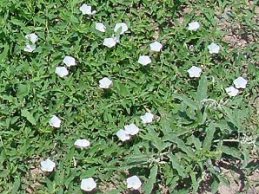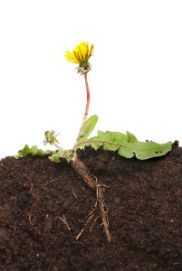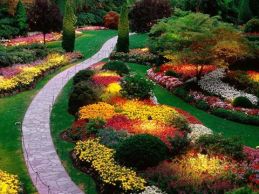Weeds. The bane of every gardener, horticulturalist, and lawn aficionado. Every garden and lawn has them — even the most meticulously kept ones (though the weeds may be tiny!). I especially hate dandelions and field bindweed that seems to take over certain parts of the lawn. The front yard usually isn’t too bad, but the back yard is a different story… thank goodness hardly anyone sees that on a regular basis!
 There are thousands upon thousands of different kinds of weeds. There are those that grow thin and tall with shallow roots, those that spread and grow rapidly (practically overnight), those that are thorny and prickly and even poisonous. There are those that look small and pretty but whose roots go deep and are tough to dig out. And then there are the ones that seem delicate and beautiful because they have small bright flowers, so you leave them alone until you realize they’ve taken over most of the lawn — like dandelions and bindweed. When I see bindweed, I’m often tempted to rip up the entire yard and replace every inch of grass with cement and rocks like they do in Arizona!
There are thousands upon thousands of different kinds of weeds. There are those that grow thin and tall with shallow roots, those that spread and grow rapidly (practically overnight), those that are thorny and prickly and even poisonous. There are those that look small and pretty but whose roots go deep and are tough to dig out. And then there are the ones that seem delicate and beautiful because they have small bright flowers, so you leave them alone until you realize they’ve taken over most of the lawn — like dandelions and bindweed. When I see bindweed, I’m often tempted to rip up the entire yard and replace every inch of grass with cement and rocks like they do in Arizona!
I have a LOT of experience pulling weeds that goes all the way back to my childhood (shudder and mutter). Back home, we had a two-acre plot with all sorts of fruit trees and several large gardens where we grew strawberries, potatoes, and a variety of produce. If it could possibly be grown in Ohio, it could probably found somewhere on our property. When we weren’t slaving away weeding, roto-tilling, binding, weeding, planting, hoeing, weeding, pruning, picking, or weeding, we would be chopping, throwing, or stacking wood for the winter. Did I mention weeding? It was always my least favorite part of our chores…
While some weeds are relatively easy to pull and keep under control, what about the really tough ones? How do you get rid of those? Roundup doesn’t always work, either! What about the ones whose roots reach way down deep and spread out like tree roots? If you don’t tear out the root system, those weeds will practically grow right back before you’ve finished mowing the lawn! And since paving them over usually isn’t an option, where do you even start with those?
 First, you need to soften the soil, either with water, air, or both (and sometimes earthworms). Back home as kids, we had a love/hate relationship with rain. We loved it because it cooled everything off and gave us a break from working outside. However, as soon as it was over, Mom or Dad would say “Looks like it’s a great time to pull weeds!” Why? Because the soil was finally soft, especially since we had a fair amount of clay in it that would harden into brown brick after a couple days of hot sunshine.
First, you need to soften the soil, either with water, air, or both (and sometimes earthworms). Back home as kids, we had a love/hate relationship with rain. We loved it because it cooled everything off and gave us a break from working outside. However, as soon as it was over, Mom or Dad would say “Looks like it’s a great time to pull weeds!” Why? Because the soil was finally soft, especially since we had a fair amount of clay in it that would harden into brown brick after a couple days of hot sunshine.
Next, you have to get your hands dirty and dig deep. Grab them as close to the root as possible and start twisting, turning, wiggling, and even digging. The weeds have to be pulled up by the roots or they’ll just come back bigger, stronger, and deeper than ever! Sure, it’s much easier to just rip off the visible part, but then you’ll be right back where you were in a week or two dealing with the same weeds as if you never touched them in the first place.
Whenever I’m outside pulling weeds (while muttering under my breath), I often think about the significance of weeds and what they really represent in spiritual terms. They quickly grow tall and wide seemingly without effort. No one plants them, yet they spring up out of the ground wherever you look. Useful plants and grasses have to be sowed, watered, and cared for, but not weeds! Weeds are hardy, relentless, and parasitic — leave any plot of ground unattended for a month or two and I can almost guarantee that it’ll be covered with weeds of every sort. While some animals like sheep and goats will eat the leafier varieties (though bitter), most weeds are useful for very little except destroying what is beautiful, edible, and pleasant. The thorny, bristly ones can be eaten by very few animals and insects, and are typically just parasitic; they steal moisture and sunlight from the useful plants and grasses and just invade the landscaping. They’re literally good for nothing except burning.
Why do weeds even exist in the first place? I have yet to see a plausible evolutionist model for weeds and how they provide any benefit to the food-chain! However, the reason and purpose for weeds fits very nicely with the Bible and practical, biblical truths. Weeds are a direct result of the Curse that goes all the way back to the Fall in the Garden of Eden. Weeds are a perfect, ever-present reminder of the Curse upon this fallen world. Every time we look down and see a weed, we inherently know on some level that this world isn’t as it should be, that the Curse that God pronounced upon it in Genesis 3 is still in very-much in effect today:
17 Then to Adam He said, “Because you have heeded the voice of your wife, and have eaten from the tree of which I commanded you, saying, ‘You shall not eat of it’:
“Cursed is the ground for your sake;
In toil you shall eat of it
All the days of your life.
18 Both thorns and thistles it shall bring forth for you,
And you shall eat the herb of the field.
19 In the sweat of your face you shall eat bread
Till you return to the ground,
For out of it you were taken;
For dust you are,
And to dust you shall return.”
I believe that one of the reasons why God cursed the earth with weeds and thorns wasn’t merely to punish Adam and his descendants for our sins, but to regularly remind us of our fallen condition and that we’re in desperate need of the Savior, the One who will someday reverse the Curse and its effects on His creation. Pulling weeds is often mindless, toilsome work, and which happens to be the perfect time to think about “pulling the weeds” in our own lives. Just like every garden and lawn has those lurking weeds that need to be pulled, all our lives have those lurking sins that need to be dealt with.
Sins are very much like weeds – they pop up overnight and in the strangest of places, and can be extremely destructive if not promptly and thoroughly taken care of. The longer we let our sins go, the deeper their roots will grow and the more they will enslave our heart and destroy our life. Some sins look pretty and pleasant like dandelions, bindweed, or kudzu, but before you know it, they’ve taken over everything and are choking the life from us. Seemingly without realizing it, we’re enslaved to our own personal weeds, and often those of others who are close to us.
Another similarity between weeds and sin is that often both start out as small and relatively insignificant, but they never stay that way for long. No matter how much we try to ignore them and pretend that they’re really not that bad, the harder we’re making it on ourselves when the time finally comes to pull them. Every weed gets pulled sooner or later, but they’re much easier to deal with when they’re small and shallow. The same holds true in the spiritual realm — sins are much easier to deal with before they’ve grown too large and taken root, before they become addictions and are destroying our lives and those we love. I believe that we all have a choice: we can pull those weeds or eventually God will start pulling them for us whether we like it or not! He loves us too much to allow us remain in our sins and let them destroy us.
 God wants us to have innocent, unhindered, beautiful relationships with Him and others, and that means keeping the “garden of our hearts” well-maintained and weed-free. Quite often our communication with God is blocked by sins that we’re hiding or simply not dealing with. Why does God seem silent towards us or distant at times? Why does it feel like our prayers keep bouncing off the ceiling? Is that His doing or could it be ours? Isaiah 59:1-2 declares “Behold, the Lord’s hand is not shortened, that it cannot save, or his ear dull, that it cannot hear; but your iniquities have made a separation between you and your God, and your sins have hidden his face from you so that he does not hear.”
God wants us to have innocent, unhindered, beautiful relationships with Him and others, and that means keeping the “garden of our hearts” well-maintained and weed-free. Quite often our communication with God is blocked by sins that we’re hiding or simply not dealing with. Why does God seem silent towards us or distant at times? Why does it feel like our prayers keep bouncing off the ceiling? Is that His doing or could it be ours? Isaiah 59:1-2 declares “Behold, the Lord’s hand is not shortened, that it cannot save, or his ear dull, that it cannot hear; but your iniquities have made a separation between you and your God, and your sins have hidden his face from you so that he does not hear.”
Confessing our sins to Him and then repenting of them — turning away from them and not falling back into them — is the spiritual equivalent of pulling weeds from our heart-garden. However, just like weeds always seem to come back every spring and must be pulled again and again, we must be vigilant and maintain our heart-gardens on a frequent, regular basis so they don’t grow out of control again. When we let those little sins go, before we know it, they’re choking our spiritual lives and overtaking our garden!
The good news is that it’s not just up to us in our own strength to keep our heart-gardens weed-free — the Holy Spirit continually helps us by bringing them to light and convicting us of our sins. God is committed to conforming us to Himself and helping us grow closer to Him, though it will take the rest of our lives and often involves trials, suffering, and patience. In Christ, we have the freedom and authority to determine what type of “garden” we want in our lives, whether it’s full of weeds or relatively weed-free.
“Do not be deceived, God is not mocked; for whatever a man sows, that he will also reap. For he who sows to his flesh will of the flesh reap corruption, but he who sows to the Spirit will of the Spirit reap everlasting life. And let us not grow weary while doing good, for in due season we shall reap if we do not lose heart. Therefore, as we have opportunity, let us do good to all, especially to those who are of the household of faith.” — Galatians 6:7-10

Thank you for allowing God to use your words to convict and comfort and confirm!
LikeLike
Thanks, Sue! I enjoyed your post about 1st John and being thankful the other day — good stuff! 🙂
LikeLike
Thanks Chris! I needed this.
LikeLiked by 1 person